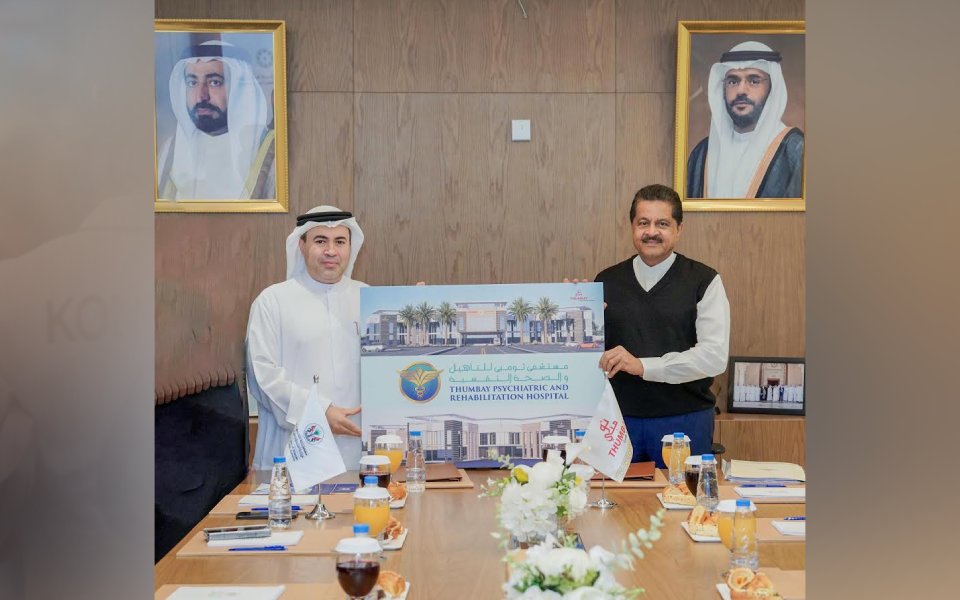Sharjah (UAE): In a first, the Thumbay Group has announced plans to establish the region's first private Psychiatric and Rehabilitation Hospital in Sharjah Healthcare City. The Hospital is set to become the largest private facility of its kind in the region.
The hospital will focus on Innovation and Patient-Centered Care and the hospital is equipped to meet the highest clinical standards, offering Advanced Therapeutic Modalities, Comprehensive Rehabilitation Programs, Integrated Tele-health Solutions and Precision Medicine among others.
The hospital’s multidisciplinary model includes psychiatrists, psychologists, addiction counselors, family therapists, physical therapists, and occupational specialists, ensuring a holistic and individualized approach to patient care.
Thumbay Psychiatric and Rehabilitation Hospital will be developed in two phases. Phase 1 includes 60 inpatient beds and 12 outpatient clinics (OPDs) and Phase 2 adds another 60 beds, bringing the total capacity to 120 beds. Construction is set to begin in June 2025, with the hospital expected to be operational by mid-2026.
Key Features of the Hospital:
1. Psychiatric Care:
-
Diagnosis and Treatment.
-
Therapeutic Interventions.
2. Rehabilitation Services:
-
Substance Abuse Rehabilitation
3. Long-term Care and Aftercare:
-
Aftercare Programs
-
Inpatient VIP Villas.
4. Swimming Pool and Spa
5. A mosque (Thumbay Masjid) with a capacity for 500-600 worshippers, open to the public.
Commitment to International Standards
Thumbay Psychiatric and Rehabilitation Hospital seeks to achieve Commission on Accreditation of Rehabilitation Facilities (CARF) certification, reflecting its adherence to rigorous global benchmarks in safety, quality, and effectiveness. The hospital will also comply with all UAE healthcare regulations, further emphasizing its commitment to ethical and evidence-based practices.
Dr. Thumbay Moideen, Founder and President of Thumbay Group, said, “This is the first private Psychiatric and Rehabilitation Hospital in the region, catering to regional and international patients seeking world-class care. Our goal is to make it the best facility serving the community.”
In a statement, His Excellency Dr. Abdelaziz Al Mheiri, Chairman of Sharjah Health Authority and Sharjah Healthcare City, lauded the initiative, saying, “This project aligns with our vision for Sharjah Healthcare City, where we prioritize all aspects of healthcare. Mental health is increasingly critical and often overlooked, and we are proud to host such a pioneering hospital.”
Let the Truth be known. If you read VB and like VB, please be a VB Supporter and Help us deliver the Truth to one and all.
Mumbai (PTI): NCP's Rajya Sabha member Sunetra Pawar will be sworn-in as the Deputy Chief Minister of Maharashtra, replacing her deceased husband and party chief Ajit Pawar, at the Lok Bhavan here at 5 pm on Saturday.
Lok Bhavan (formerly Raj Bhavan) gave this information.
Governor Acharya Devvrat, who is currently in Mussoorie, will arrive in Mumbai at 4 pm, it said.
NCP's legislature party meeting is scheduled to take place in the city at 2 pm, where Sunetra Pawar is set to be named as its leader. After that she will take oath as the first woman deputy CM of the state.
She held talks with party leaders after arriving here from Baramati early morning on Saturday.
Ajit Pawar, who was deputy chief minister and finance minister in the Devendra Fadnavis-led Mahayuti government, was killed in a plane crash in Baramati along with four others on January 28.





